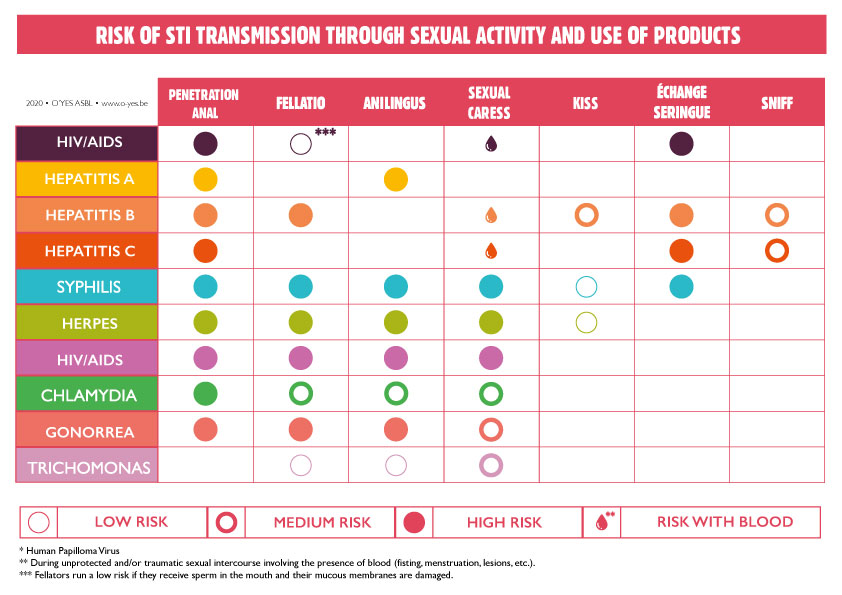Risk taking
Taking a risk includes having unprotected sex (with or without penetration), sharing used needles or sniffing equipment, having contact with a lesion, etc.
Remember that having unprotected sex with someone you know and trust is still a risk because you don't always know if you or the other person is infected with HIV or another STI.
Transmission modes

Human Papilloma Virus
During unprotected and/or traumatic sexual intercourse involving blood (fisting, menstruation, lesions, etc.)
The person performing oral sex is at low risk if he or she receives semen in the mouth and has damaged mucous membranes
What to do if you take risks?
In case of emergency
Contact a doctor, a specialised centre, a family planning centre or a specialised association. With these professionals, you can discuss and evaluate the possible risks involved.
Post-exposure treatment for HIV (PEP)
For people most at risk of HIV: within 48 hours (72 hours MAXIMUM) after a high-risk and unprotected sexual encounter (sexual assault, intercourse between men, intercourse with a person from a country heavily affected by HIV, etc.), it is possible to go to the emergency room of a hospital specialising in HIV to request an EPC, which can still prevent a possible contamination with HIV/AIDS. It is best to go as soon as possible. The treatment is always free of charge, but the follow-up is charged and reimbursed by the health insurance companies. VCT is rarely available outside specialised HIV centres and will be charged for.
To find out where to get post-exposure processing, go to this page.
Emergency contraception
To avoid an unplanned pregnancy, if you have forgotten your condom or if it has broken and you have no contraception, think about emergency contraception.
Go to as soon as possible to a pharmacy, your doctor or a family planning centre. Depending on your situation, you will be advised which emergency contraception is best for you.
There are several types:
- The 'classic' emergency pill: you can take it up to 3 days after unprotected sex. It will cost you about 1 euro in the pharmacy.
- The emergency pill "EllaOne": you can take it up to 5 days after unprotected sex. It will cost you about 16 euros at the pharmacy.
- The Intra Uterine Device (IUD): You can also choose to have a copper IUD inserted up to 5 days after risky sex or up to day 12 of your cycle.
Since September 2020, the emergency pill has been available to everyone without a prescription.
For more information, click here.
CAUTION: Emergency contraception does not protect against STIs!
Self-examination
Self-examination is not enough on its own, but you can check for STIs yourself. Be alert to the slightest unusual sign in your genitals, such as unusual odours or discharge, itching, pimples, redness, etc. If this is the case, do not hesitate to consult a doctor as soon as possible to be tested.
Think regularly about screening
Several types of screening can be offered: clinical examination, blood test, cervical, vaginal, anal or throat smear, or urine sample.

Have you contracted an STI?
- Don't treat yourself! Do not use ointments, disinfectants or antibiotics without medical advice.
- Follow the treatment to the end. Follow the prescribed dose and duration of treatment to get the most effective treatment possible.
- During treatment, continue to use a condom with your partners.
- Warn your partners. It is essential that everyone is tested and treated in time to limit the risk of re-infection and break the chain of transmission.
- Once cured, continue to protect yourself: except for hepatitis A and B and some strains of papillomavirusThere is no vaccine for STIs. A new infection is therefore always possible!
